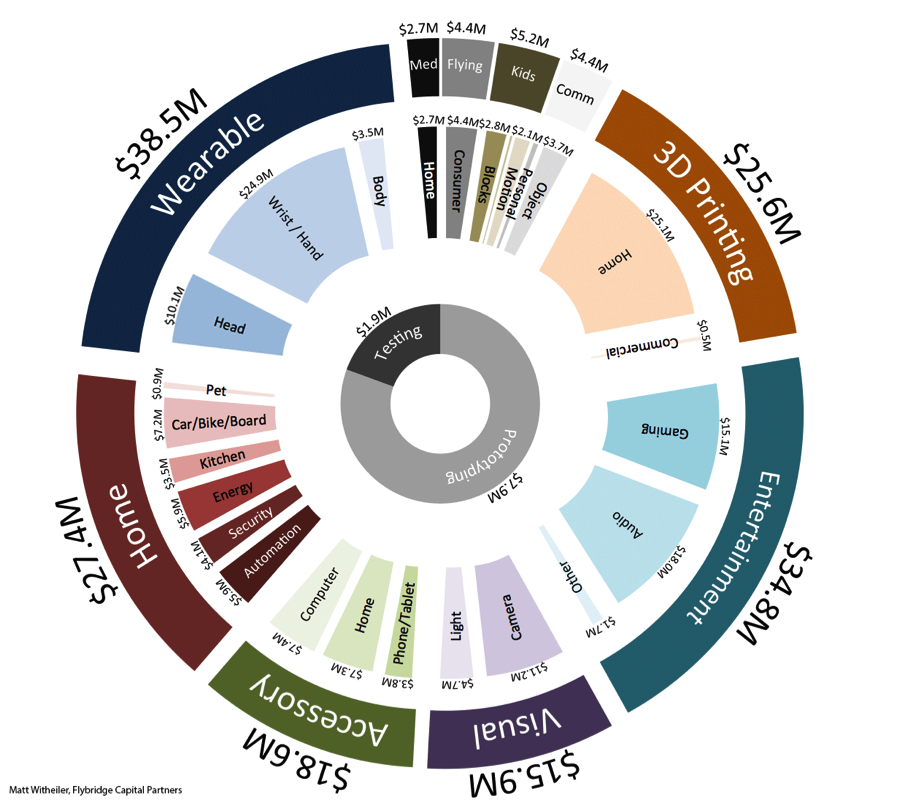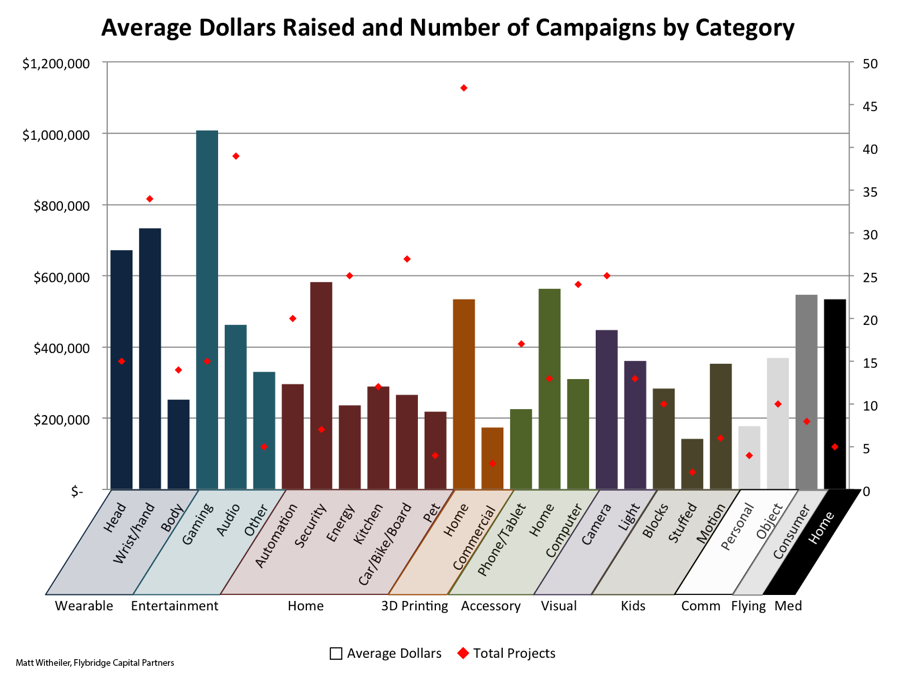Matt Witheiler
More posts from Matt Witheiler
Editor’s note: Matt Witheiler is a General Partner at Flybridge Capital Partners. You can follow him on his blog.
In the past six years crowdfunding has become a popular, if not the most popular, form of financing for hardware startups, potato salad distractions notwithstanding. Over the years we’ve seen a variety of successful crowdfunding campaigns translate early crowd love into great venture capital rounds. We’ve even seen a few, like Oculus VR, manage to use successful campaigns to catalyze massive exits. Crowdfunding has changed the face of hardware investing, giving startups a chance to prove product-market-fit without the massive costs of going into mass production.
Given that crowdfunding is the initial step more and more hardware startups are taking, the need to better understand what types of products do well on crowdfunding platforms feels in order. The problem is that the two dominant platforms, Kickstarter and Indiegogo, don’t do a great job of categorizing projects. Hardware project types are loosely categorized at best. There has to be a better way to understand what is going on in these marketplaces – after all, knowing what categories are “hot or not” can help determine where there may be opportunity.
To this end, over the past two weeks I hunched over my computer and crunched the data. Here is what it shows.
The Data Set
To somewhat narrow the scope of work, only hardware projects raising $100K or more on Kickstarter or Indiegogo made the cut. Hardware projects were defined as any project requiring electronic components. For example, connected bike locks made the cut but “dumb” metal ones did not. There are plenty of platforms and project types out there but this sample should be broadly representative of the broader hardware crowdfunding community. It’s worth noting that the data is a moving target since these platforms are constantly seeing new projects. The data here represents a snapshot taken around June 20, 2014.
There were 443 total hardware projects that raised north of $100K across Kickstarter and Indiegogo since the platforms started. Those 443 raised a total of $187.5 million in crowdfunding. Kickstarter accounted for 83 percent of the projects and Indiegogo made up 17 percent of them. The average project raised $423,188 across both platforms but it’s telling to note that the average Kickstarter project raised nearly 40 percent more than the average Indiegogo project (likely due to the greater number of huge projects found on Kickstarter). So, an average “win” on these sites is a $420K raise and, at least based on historical performance, you’re better off going to Kickstarter than Indiegogo.
Bringing in the Money
Hardware projects come in a wide range of forms. The only way to accurately tell what types of hardware projects are raising money from the crowd is to categorize each. This allows for a much more complete view of the hardware ecosystem. In an attempt to categorize each project, I created 12 broad categories and broke those into a total of 26 more sub categories. When broken out by dollars, you can make a map of the crowdfunded hardware ecosystem that looks something like this:

A few winners jump out looking at this. The big four categories — wearables, entertainment, home and 3D printing — made up 67 percent of all dollars raised in hardware. Inside of those, the big winners were the home 3D printing category and wrist/hand wearable category, which accounted for a shocking 27 percent of all dollars. Those categories also did remarkably well in terms of average dollars per successful campaign but at the expense of being the most crowded:

In fact, while home 3D printers have been wildly popular in terms of dollars raised, the category is also the most crowded with 47 3D printing companies having gone on to raise $100K or more in crowdfunding.
Likewise, there have been 34 hand/wrist wearable crowdfunded companies at that level. The outlier in terms of average dollars is the gaming category, owning huge campaigns at OUYA ($8.6 million), Oculus VR ($2.4 million) and Virtuix Omni ($1.1 million), suggesting if you win over the hearts of gamers, they’ll open their wallets.
Not faring so well are the medical devices, kid-focused products and flying objects categories. Medical devices are naturally limited due to the fact they have historically not been allowed on Kickstarter and the children’s category has been difficult to build businesses in. The fact that drones and UAVs have not garnered much traction is surprising given the investor interest here. Perhaps the majority of drone companies are too commercially focused to be good targets for crowdfunding.
There are lots of categories between these bookends. The distribution of dollars suggests that the long tail in the hardware category is quite long: 43 percent of all dollars raised were from the 37 projects that surpassed $1 million in total crowdfunding. The remaining 368 projects made up 57 percent.
Summary
What can we learn from the crowd when it comes to hardware startups? A few things. For one, in order to really feel like a campaign is a big success it should raise $211,290 or more; it’s at that level that it has done better than 50 percent of all hardware crowdfunding campaigns (the median). Another takeaway is that when it comes to categories, not all are created equal in the eyes of the crowd.
3D printing, for example, has done incredibly well but medical devices have not. And while both 3D printers and wrist/hand wrist wearables have done well historically, they’re becoming crowded and run the risk of hitting consumer crowdfunding fatigue. The pet and gaming categories, on the other hand, do not suffer the same overcrowding concern. There are lots of insights in the data but really what it suggests is that the ecosystem for crowdfunding hardware projects is alive and well.
In the spirit of openness I’ve shared all the data collected in the making of this post on Google Docs here. Feel free to poke around, get more granular on the data or create your own version.































Comment